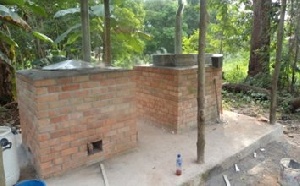Regional News of Monday, 15 September 2014
Source: GNA
Improved cookstove introduced to students
The Technology Consultancy Centre (TCC) of the College of Engineering, Kwame Nkrumah University of Science and Technology, has introduced its first biomass improved cookstove to students of Kumasi Secondary Technical.
The new product would address all concerns related to indoor cooking, especially for cooks, students and matrons.
Dr George Y. Obeng, Director of TCC, addressing the students at the presentation of the cookstove, expressed gratitude to the Ghana Alliance for Clean Cookstove and Fuel which saw the innovation of the TCC and supported the project.
He said the Centre would organise design and development competition in secondary schools and tertiary institutions to contribute to the advancement of biomass stove advocacy.
Dr Obeng said the use of the improved biomass cookstoves would reduce acute respiratory illnesses and even cancer, which affected women disproportionately.
“Using traditional biomass stoves for household cooking requires extensive local fuel collection and is linked to environmental problems,” he said.
He said biomass burned inefficiently and contributed to climate change, adding; “the climate change debate needs to take household energy issues into consideration.”
Mrs Florence Mary Osei, Headmistress of the Kumasi Secondary Technical School, said the initiative by TCC would go a long way to reduce traditional stoves in the kitchen from 13 to four.
This would help to create more space for safety and good working conditions.
She said: “Before the introduction of the improved stove the women who cook for the school report at 3.00 am to prepare breakfast, but now they report between 5.00 am and 5.30 am. The stove also helps in cooking large quantities of food in an hour as against three hours.
“The improved stove now saves about 75 to 85 per cent of fuel wood and 90 to 95 per cent of smoke is reduced. Now our kitchen walls will look smokeless, clean and tidy.”
Mrs Osei said the initiative had improved the health of the women as they had enough sleep and avoided risks associated with traveling at dawn.
Mr Michael Kweku Commey, a Research Fellow and Head of Applied Industrial Ceramic, Rural Energy and Enterprise Development Unit of KNUST, said the Unit was working hard to develop templates and prefabricated parts to reduce the manufacturing days from two weeks to a minimum of two days.











